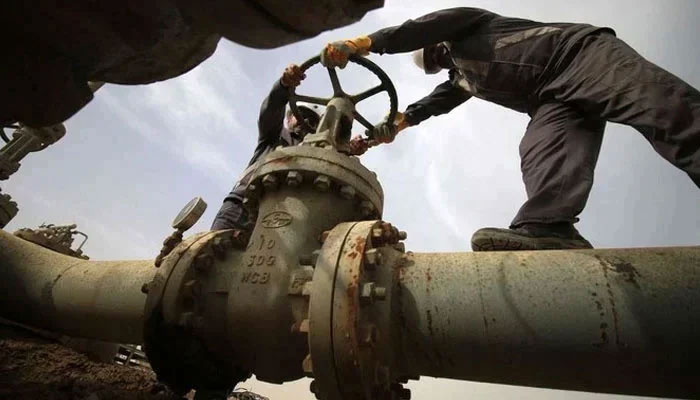Gas line pack again swells to over 5bcf
This situation is continuing for the last two days
ISLAMABAD: Pakistan’s gas transmission system is in hot water again, as the line pack has increased to 5.053 billion cubic feet (bcf).
This situation is continuing for the last two days. The pressure in the main pipeline has increased, as the power sector reduced consumption of RLNG by over 400 mmcfd for power generation.
If the line pack of over 5bcf continues for more days, the pipeline can burst any time. Under this scenario, the whole country would suffer.
Sui Northern has asked state-owned exploration and production (E&P) companies — OGDCL (Oil and Gas Development Company Limited), MPCL (Mari Petroleum Company Limited), PPL (Pakistan Petroleum Limited) — to reduce gas outflows to scale down line pack pressure and safeguard the system, senior officials at the Energy Ministry told The News.
“The limit of maximum gas volume in the pipeline is 4.5 billion cubic feet (bcf). If gas volume increases beyond this limit, transmission system can burst anytime, causing a gas and electricity crisis,” officials warned.
The SNGPL says reduced offtake of RLNG by power sector is causing high system pack across the gas transmission network. “Mitigation steps are being taken accordingly,” it said.
Officials said line pack of over 5bcf has hit the main gas pipeline seven times starting from April, 2024, putting the system in jeopardy. In April, the system was hit two times, in May two more times and in July two times. Now in August, pressure of over 5bcf has again hit the system on Wednesday.
The authorities have failed to find a sustainable way out except reduction of gas outflows from local gas fields and slowing down regasification process of imported LNG.
This reduction in gas flow from local gas fields poses significant risks to maintaining current local gas production level. But authorities are left with no option to ease the pressure. The exploration and production companies cautioned the authorities that the practice of decreasing local gas flows to safeguard the gas transmission system was perilous.
The power sector does not prefer to generate electricity from four RLNG based power plants on the rationale that fuel cost in RLNG plant is Rs26 per unit. That is why RLNG based electricity generation comes at the end of Economic Merit Order (EMO), and it adversely affects basket price of electricity. The Power Division takes this step when demand of electricity is reduced in the country.
-
 Winter Olympics 2026: Lindsey Vonn’s Olympic Comeback Ends In Devastating Downhill Crash
Winter Olympics 2026: Lindsey Vonn’s Olympic Comeback Ends In Devastating Downhill Crash -
 Adrien Brody Opens Up About His Football Fandom Amid '2026 Super Bowl'
Adrien Brody Opens Up About His Football Fandom Amid '2026 Super Bowl' -
 Barbra Streisand's Obsession With Cloning Revealed
Barbra Streisand's Obsession With Cloning Revealed -
 What Did Olivia Colman Tell Her Husband About Her Gender?
What Did Olivia Colman Tell Her Husband About Her Gender? -
 'We Were Deceived': Noam Chomsky's Wife Regrets Epstein Association
'We Were Deceived': Noam Chomsky's Wife Regrets Epstein Association -
 Patriots' WAGs Slam Cardi B Amid Plans For Super Bowl Party: She Is 'attention-seeker'
Patriots' WAGs Slam Cardi B Amid Plans For Super Bowl Party: She Is 'attention-seeker' -
 Martha Stewart On Surviving Rigorous Times Amid Upcoming Memoir Release
Martha Stewart On Surviving Rigorous Times Amid Upcoming Memoir Release -
 Prince Harry Seen As Crucial To Monarchy’s Future Amid Andrew, Fergie Scandal
Prince Harry Seen As Crucial To Monarchy’s Future Amid Andrew, Fergie Scandal -
 Chris Robinson Spills The Beans On His, Kate Hudson's Son's Career Ambitions
Chris Robinson Spills The Beans On His, Kate Hudson's Son's Career Ambitions -
 18-month Old On Life-saving Medication Returned To ICE Detention
18-month Old On Life-saving Medication Returned To ICE Detention -
 Major Hollywood Stars Descend On 2026 Super Bowl's Exclusive Party
Major Hollywood Stars Descend On 2026 Super Bowl's Exclusive Party -
 Cardi B Says THIS About Bad Bunny's Grammy Statement
Cardi B Says THIS About Bad Bunny's Grammy Statement -
 Sarah Ferguson's Silence A 'weakness Or Strategy'
Sarah Ferguson's Silence A 'weakness Or Strategy' -
 Garrett Morris Raves About His '2 Broke Girls' Co-star Jennifer Coolidge
Garrett Morris Raves About His '2 Broke Girls' Co-star Jennifer Coolidge -
 Winter Olympics 2026: When & Where To Watch The Iconic Ice Dance ?
Winter Olympics 2026: When & Where To Watch The Iconic Ice Dance ? -
 Melissa Joan Hart Reflects On Social Challenges As A Child Actor
Melissa Joan Hart Reflects On Social Challenges As A Child Actor




